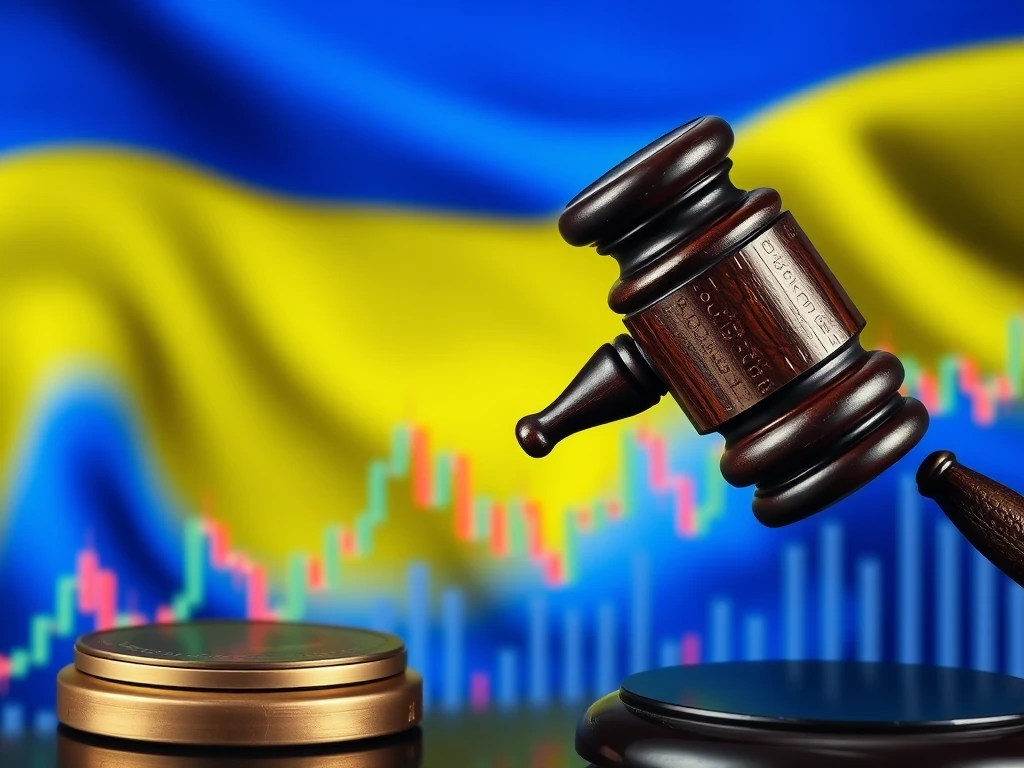Shocking Polymarket Scrutiny: $7M Ukraine Mineral Deal Bet Sparks Crypto Governance Crisis

Hold onto your crypto wallets! The decentralized prediction market Polymarket is facing intense Polymarket scrutiny after a $7 million bet on a supposed Ukraine mineral deal went south, raising serious questions about crypto governance and market manipulation. Did a whale rig the system, or was it just plain negligence? Let’s dive into this unfolding drama that has the DeFi betting world buzzing.
Unpacking the Polymarket Ukraine Mineral Deal Controversy
Polymarket, a leading platform in the decentralized prediction market space, found itself in hot water over a market asking if Donald Trump would agree to a rare earth Ukraine mineral deal before April. Despite no such deal materializing, the market bizarrely resolved as “Yes.” This sparked immediate outrage and accusations of foul play.
Here’s a breakdown of the key events:
- The Bet: A market was created on Polymarket about a Trump/Ukraine mineral deal.
- The Outcome: Despite no deal happening, the market was settled as “Yes.”
- The Backlash: Users and industry observers cried foul, alleging manipulation.
- The Accusation: Crypto researcher Vladimir S. pointed to a potential “governance attack” by a whale from the UMA Protocol.
Vladimir S. claims a single entity, a “tycoon,” used 5 million tokens across multiple accounts to sway the vote, representing a significant 25% of the total votes. This alleged manipulation highlights a critical vulnerability in decentralized governance models.
Was it Manipulation or Negligence in the Prediction Market?
While accusations of prediction market manipulation fly high, not everyone is convinced it was a deliberate attack. Pseudonymous Polymarket user Tenadome suggests a different narrative: negligence.
Tenadome argues that the voters, UMA whales typically involved in dispute resolutions (and often linked to the UMA team), simply overlooked clarifications and voted in their own favor to secure rewards and avoid penalties. Essentially, they may have been careless rather than malicious. This raises a crucial question: Is negligence in governance just as damaging as intentional manipulation?
Two Sides of the Coin: Manipulation vs. Negligence
| Manipulation (According to Vladimir S.) | Negligence (According to Tenadome) |
|---|---|
| Deliberate attack by a whale to profit. | Carelessness and lack of due diligence by UMA voters. |
| Intentional exploitation of governance mechanisms. | Unintentional misjudgment or oversight in voting. |
| Points to a serious security flaw in Polymarket’s governance. | Highlights a lack of engagement and responsibility from key voters. |
The Fallout: No Refunds and Lingering Crypto Governance Concerns
Despite user outrage and the questionable outcome, Polymarket has firmly stated that no refunds will be issued. Moderator Tanner explained that because it wasn’t classified as a “market failure,” refunds are not possible. This decision has further fueled user frustration and amplified crypto governance concerns within the community.
Polymarket has acknowledged the issue and promised to implement new monitoring systems to prevent similar situations. However, the damage to user trust and platform reputation may already be done. This incident serves as a stark reminder of the challenges decentralized platforms face in maintaining fair and transparent governance, especially in high-stakes DeFi betting environments.
The Bigger Picture: Prediction Markets and the Future of DeFi
This Polymarket controversy arrives at a time when prediction markets are experiencing explosive growth, particularly fueled by events like the upcoming US elections. Data from CoinGecko reveals a staggering 565% surge in betting volume in Q3 2024, reaching $3.1 billion across major platforms, with Polymarket dominating the market share.
Prediction Market Growth in Q3 2024:
- 565% Increase: Betting volume surged dramatically.
- $3.1 Billion: Total volume across top 3 markets.
- Polymarket Dominance: Platform holds over 99% market share.
- US Elections Fuel: Presidential election bets are a major driver.
While the growth is exciting, the Polymarket incident underscores the critical need for robust and transparent governance mechanisms in decentralized platforms. As DeFi betting and prediction markets continue to evolve, ensuring fairness, preventing manipulation, and maintaining user trust will be paramount for their long-term success. The Polymarket scrutiny is a wake-up call for the entire decentralized ecosystem.
This situation is a powerful reminder that even in the decentralized world of crypto, vigilance and robust governance are essential. The future of platforms like Polymarket, and indeed the broader DeFi space, hinges on their ability to address these critical vulnerabilities and build trust with their users. The Ukraine mineral deal bet may be just one incident, but its ripple effects could shape the trajectory of decentralized prediction markets for years to come.





